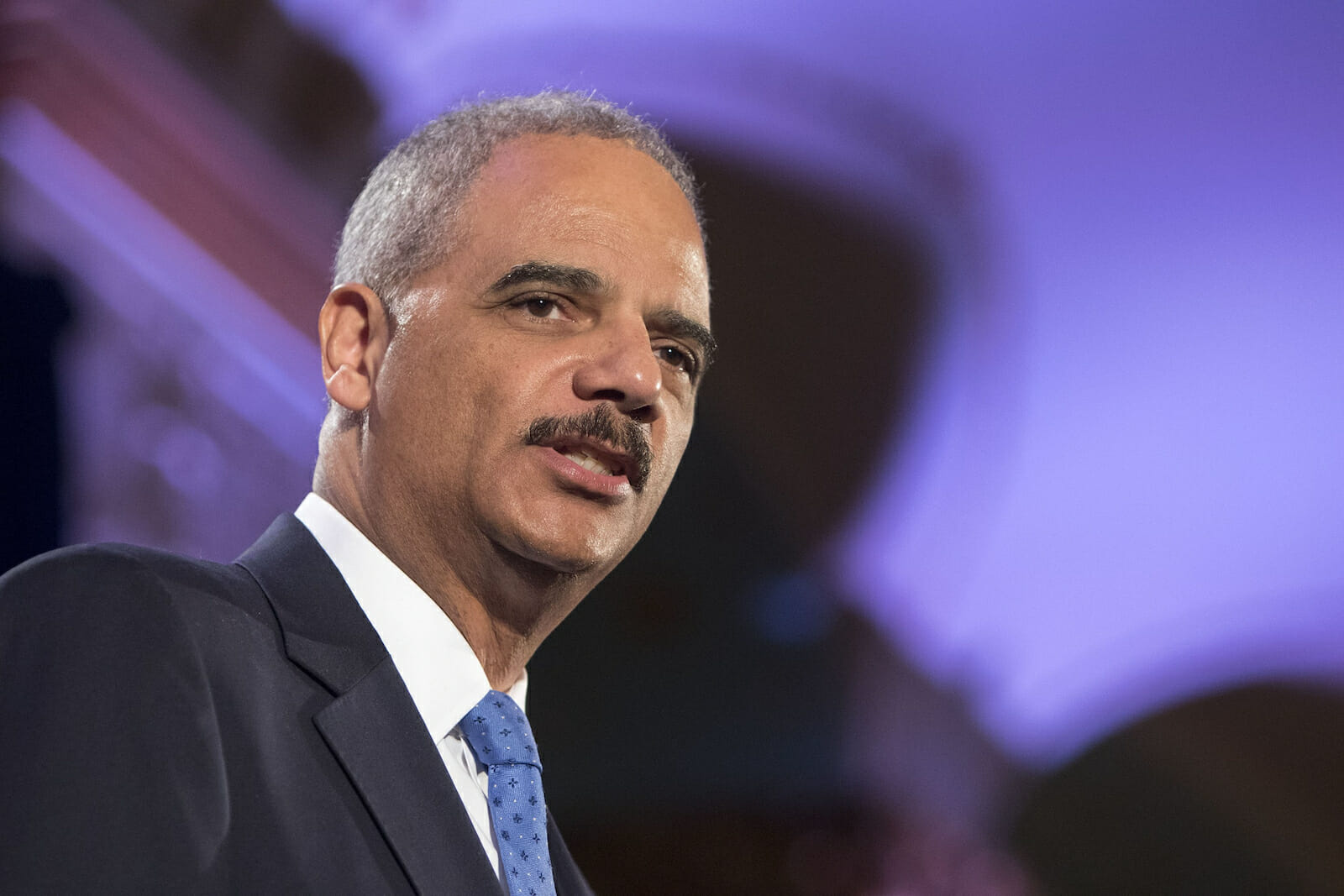
Eric Holder’s Beltway Blinder Syndrome
Parents always rightfully warn their kids when spending blissful summer days at the beach to “never turn your back on the ocean.” The essential life lesson here is obvious and yet often unappreciated by the uninformed: The ocean is beautiful, majestic but powerfully consequential and at times, deadly. The same thing goes for the press, especially if you are a media spokesperson during a crisis or an aspiring press maven. The Department of Justice’s (DOJ) Attorney General, Eric Holder’s recent attempt to appease the media in the wake of the ongoing Associated Press scandal in which the Federal Bureau of Investigation surreptitiously obtained telephone records of AP reporter and the espionage investigation against a well-known Fox News Reporter, James Rosen has served to fall short of its envisioned goal of crisis management. The reason for its failure can be understood most effectively by evaluating the media’s role in society and what this entails in our ever-expanding internet intensive world.
The 18th century Irish philosopher Edmund Burke and 19th century English journalist William Cobbett are credited with popularizing the term the “4th Estate” to describe a social, cultural, or political entity that influences society at large but whose impact and role may not be officially recognized. The other three so-called “Estates” were considered the major elements of a State, consisting of the nobles, the clergy, and the common everyday person. Today, societies with liberal democracies define the 4th Estate as the powerful watchdog media. The concept of the 4th Estate loosely delineates the media as a societal, cultural, and political entity that encompasses an ethical and moral responsibility; in effect, one that brings a discerning balance to the other three. This transcendent entity, then, is duly tasked with revealing great abuses of the State (and/or corporate) authority and defending the democratic rights of citizens (and shareholders, customers, partners, affiliated constituencies, alike).
This expansive, evolving media plays a vital role in society. The media performs a number of crucial functions including watchdog, megaphone, and advocate, and working to understand and harness it can prove tortuous. In fact, author Oscar Wilde famously opined, “In old days men had the rack. Now they have the Press.” A humorous observation, at first, to be sure – it grows increasingly poignant, however, when we begin to examine the roles of and different approaches to the Press in our 24-hour, on-demand, Web-connected news world.
The media and their sources are no longer concentrated in the hands of a few television networks or dominated by a handful of major newspaper publications. This change is largely due to the acceptance of alternate sources for information and news, and the new methods for acquiring or distributing it. Countless venues for information and disinformation outside of traditional sources like network television and major newspapers are now available to a news consumer. The Internet has given birth to a fragmented concept of “traditional” and “accepted” media – a new status quo of sorts – all encouraged by blogs, news aggregation sites, social media, and social networking sites.
Netcraft, an Internet services company based in Bath, England, provides research and analysis on the Internet. It conducts a monthly web survey in an effort to track the growth trends and proliferation of Websites on the Internet. In May of 2013, a Netcraft Webserver survey received 672,837,096 responses from sites, which was nearly a twenty four million increase over the previous month. In May of 2011, a similar Webserver survey received 324, 697,205 sites. Now compare that with its May of 2003 survey of a mere 40,444,778 Webserver responses, and it becomes clear that the propagation of Websites continues to skyrocket. Taken in isolation those survey figures illustrate an increasingly vast network of information portals. The exact breakdown of the substance of these sites is difficult to pinpoint with granular specificity, but it certainly speaks volumes to breadth and scope of informational portals available. Combine that with Facebook’s 1.11 Billion active monthly users as of the first quarter 2013, and the 200 million active monthly users of Twitter who push out more than 400 million tweets a day and one can’t help but take a step back to wonder how the substance rises above all the noise of such activity.
Noise aside, the media landscape is in a perpetual state of evolution. The traditional informational walls – news concentrated in the hands of the few – have been breached and the entire industry structure is doing some deep soul searching from a business model perspective. While the ebbs and flows of the industry itself continue to play out regularly, the function and overriding purpose of this societal safeguard remains ever present no matter what transitive or established form it takes for now.
Given this constant evolution, it would be easy for someone in the spotlight to be wary and even cynical about dealing with outlets that range from newspaper writers and editors to freelance gossip bloggers. To be fair, the media and journalists alike are not a monolithic bloc of truth-seekers, nor are they a personified societal construct of Lady Justice. They are arbiters and interpreters of a set of facts constructed in a narrative. Indeed they are even characterized in an adversarial context – an Agent Smith of sorts popularized by the Hollywood blockbuster trilogy, The Matrix. Those on the receiving end of negative press or dismal media coverage have little doubt left in their mind, as a firm, individual, celebrity dilettante, and even a political cause can be made and essentially taken down by the press, especially in terms of public perception or popularity.
Those on the receiving end of dismal coverage, whether they’re to blame for their actions, victims of circumstance, poorly prepared for an interview, or just lucky enough to be the target of the press’s scathing criticisms know the dangerous power of the media. As a societal construct, the media can be a self-imposed destroyer. Fittingly, an Old Testament passage from the Book of Isaiah can serve as a parallel to the delicate nature of the media – “Lo, I have created the craftsman [Agent Smith] who blows on the burning coals and forges weapons as his work….” The negative popularized image of the media has been diligently crafted and vilified by those who fail to navigate the torrent effectively and (unsurprisingly) by those working in that very industry and seeking to wield a great position of influence and power.
The concept to be taken away here is not, of course, a history lesson on the evolution of the media. The didactic takeaway is that the media has changed and become a less form-fitting entity. Meaning, your intuition as a spokesperson must reflect and be cognizant of that reality. The number of places that are inviting opportunities for your message to be delivered to niche and segmented audiences of consequence has increased significantly. The landscape is broader and media targets more varied. The opportunity to capitalize has consequently increased and shows no sign of abating.
So what did the DOJ do wrong? In a flawed effort to reconcile and explain their actions, as well as its plan for dealing with imminent media interactions regarding national security leaks, the DOJ essentially walked into a landmine of its own making. A meeting request was made with the Beltway’s elite media editors to chat with the embattled Attorney General Holder. The DOJ made the critical error of keeping attendance off-the-record, meaning nothing said could be quoted or turned into a substantive news piece, essentially a hush-hush affair to repair a leaking ship. The response was tepid to say the least. The New York Times, Associated Press, Huffington Post, CBS News, Fox News, and other well-established players opting out – some doing so with blistering explanatory commentary. The DOJs attempt to make amends through a non-quotable mea culpa of sorts fell well short of its intended outcome. The failure of the press outreach by the DOJ runs the spectrum, especially when under pressure to do something, and buy time to do anything without substance.
There are important lessons to be learned here with greater scope and applicability than one would imagine. As the Attorney General is dangled out as spokesperson, his refusal to go on-the-record only accentuates the problematic and conflicting effort to air the dirty laundry and repair the relations. But aside from that fact, the effort to appease only a few of the most prominent editors, not the press writers themselves mind you, speaks to a larger concern that somehow a top-down approach to managing messaging during a crisis is the optimal scenario when the truth appears to be anything but readily available. In doing so and applying a juvenile messaging control strategy to a crisis situation that has and continues to spiral out of control, simply reaffirms the notion that those tasked with public communications and messaging are blinded by the infamous out-of-touch and short-sided ‘Beltway blinder’ syndrome.
At its core, it seems that Holder’s team, in an act of desperation, forgot or failed to appreciate that the media serves multiple functions including that of societal watchdog. While attempting to control the concentrated vessels of news and widely accepted information vessels for news, it was clearly incapable of blunting the informationized reality of on-demand news creation with a dynamic, evolving means for coverage.
By the time the DOJ was ready to put forth a spokesperson, Eric Holder, the story had gone beyond containment within the realm of the media elites. The failure to respond proactively and the dismal execution of meeting with the press have served only to compound the problem. While eventually the DOJs outreach may quell some backlash, the reality is in a decentralized media environment only the truth can truly resolve an issue such as this. This way, once the facts come to light, there is no reason for top-down containment. The world of the Internet spreads the good, the bad, and the ugly across all news platforms and media outlets. The irony here is that Holder and his communications team were so blinded by the normative political machinations of a Beltway press used to dealing with inside baseball politics that it failed to calculate just how far the story would go and that, with entrenched blinders on, fumbled a response providing fodder and legs to an already compelling narrative.

